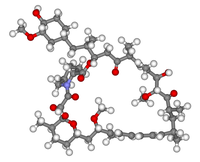
Deubiquitinase USP9X loss sensitizes renal cancer cells to mTOR inhibition.
Sign Up to like & getrecommendations! Published in 2023 at "International journal of cancer"
DOI: 10.1002/ijc.34575
Abstract: Mammalian target of rapamycin (mTOR) is a central regulator of mammalian metabolism and physiology. Aberrant hyperactivation of the mTOR pathway promotes tumor growth and metastasis, and can also promote tumor resistance to chemotherapy and cancer… read more here.
Keywords: renal cancer; inhibition; sensitivity; mtor inhibitors ... See more keywords

mTOR-targeted cancer therapy: great target but disappointing clinical outcomes, why?
Sign Up to like & getrecommendations! Published in 2020 at "Frontiers of Medicine"
DOI: 10.1007/s11684-020-0812-7
Abstract: The mammalian target of rapamycin (mTOR) critically regulates several essential biological functions, such as cell growth, metabolism, survival, and immune response by forming two important complexes, namely, mTOR complex 1 (mTORC1) and complex 2 (mTORC2).… read more here.
Keywords: mtor inhibitors; target; mtor; cancer ... See more keywords

Expert opinion on the metabolic complications of mTOR inhibitors.
Sign Up to like & getrecommendations! Published in 2018 at "Annales d'endocrinologie"
DOI: 10.1016/j.ando.2018.07.010
Abstract: Using mTOR inhibitors (mTORi) as anticancer drugs led to hyperglycemia (12-50%) and hyperlipidemia (7-73%) in phase-III trials. These high rates require adapted treatment in cancer patients. Before initiating mTORi treatment, lipid profile screening should be… read more here.
Keywords: diabetic patients; treatment; mtor inhibitors; expert opinion ... See more keywords

Effects of mTOR inhibitors on neuropathic pain revealed by optical imaging of the insular cortex in rats
Sign Up to like & getrecommendations! Published in 2020 at "Brain research"
DOI: 10.1016/j.brainres.2020.146720
Abstract: In the pain matrix, the insular cortex (IC) is mainly involved in discriminative sensory and motivative emotion. Abnormal signal transmission from injury site causes neuropathic pain, which generates enhanced synaptic plasticity. The mammalian target of… read more here.
Keywords: mtor inhibitors; insular cortex; mtor; neuropathic pain ... See more keywords

KDM1A inhibition augments the efficacy of rapamycin for the treatment of endometrial cancer.
Sign Up to like & getrecommendations! Published in 2021 at "Cancer letters"
DOI: 10.1016/j.canlet.2021.10.019
Abstract: Endometrial cancer (EC) often exhibit aberrant activation of PI3K/Akt/mTOR signaling and targeted therapies using mTOR inhibitors showed limited success. The epigenetic modifier, lysine-specific histone demethylase-1A (KDM1A/LSD1) is overexpressed in EC, however, the mechanistic and therapeutic… read more here.
Keywords: cancer; kdm1a inhibition; mtor; mtor inhibitors ... See more keywords

Upregulation of Akt/Raptor signaling is associated with rapamycin resistance of breast cancer cells.
Sign Up to like & getrecommendations! Published in 2020 at "Chemico-biological interactions"
DOI: 10.1016/j.cbi.2020.109243
Abstract: mTOR inhibitors are considered today to be one of the most promising anticancer drugs. Here to study the mechanism of the acquired resistance of MCF-7 breast cancer cells to mTOR inhibitors two different models of… read more here.
Keywords: mtor inhibitors; breast cancer; resistance; raptor ... See more keywords

Revisiting mTOR inhibitors as anticancer agents.
Sign Up to like & getrecommendations! Published in 2019 at "Drug discovery today"
DOI: 10.1016/j.drudis.2019.05.030
Abstract: The mammalian target of rapamycin (mTOR) is a highly conserved serine/threonine kinase that regulates a variety of cellular processes, influencing diverse pathological conditions including a variety of cancers. Accordingly, therapies that target mTOR as anticancer… read more here.
Keywords: mtor inhibitors; anticancer agents; mtor; revisiting mtor ... See more keywords

Research progress of mTOR inhibitors.
Sign Up to like & getrecommendations! Published in 2020 at "European journal of medicinal chemistry"
DOI: 10.1016/j.ejmech.2020.112820
Abstract: Mammalian target of rapamycin (mTOR) is a highly conserved Serine/Threonine (Ser/Thr) protein kinase, which belongs to phosphatidylinositol-3-kinase-related kinase (PIKK) protein family. mTOR exists as two types of protein complex: mTORC1 and mTORC2, which act as… read more here.
Keywords: mtor inhibitors; mtor; structure; second generation ... See more keywords

Prevalence of Cervical Infection With Human Papillomavirus of High Oncogenic Potential in Immunosuppressed Women on Renal Replacement Therapy With and Without Mammalian Target of Rapamycin Inhibitors.
Sign Up to like & getrecommendations! Published in 2018 at "Transplantation proceedings"
DOI: 10.1016/j.transproceed.2018.02.124
Abstract: BACKGROUND Chronic immunosuppression constitutes a risk factor of human papillomavirus (HPV) related cervical cancer development. Maintenance immunosuppression with mammalian target of rapamycin (mTOR) inhibitors is associated with decreased incidence of de novo malignancies in kidney… read more here.
Keywords: cervical infection; mtor inhibitors; mammalian target; mtor ... See more keywords

Renal Cell Carcinoma Associated With Xp11.2 Translocation/TFE3 Gene-fusion: A Long Response to mammalian target of rapamycin (mTOR) Inhibitors.
Sign Up to like & getrecommendations! Published in 2018 at "Urology"
DOI: 10.1016/j.urology.2018.03.032
Abstract: Objective To demonstrate that patients with Xp11.2/TFE3 gene-fusion translocation renal cell carcinoma (RCC), despite having an aggressive course in young adults, could have valid treatment options such as mammalian target of rapamycin (mTOR) inhibitors with… read more here.
Keywords: tfe3 gene; gene fusion; mtor; mtor inhibitors ... See more keywords

The Androgen Receptor is a negative regulator of eIF4E Phosphorylation at S209: Implications for the use of mTOR inhibitors in advanced prostate cancer
Sign Up to like & getrecommendations! Published in 2017 at "Oncogene"
DOI: 10.1038/onc.2017.233
Abstract: The antiandrogen bicalutamide is widely used in the treatment of advanced prostate cancer (PCa) in many countries, but its effect on castration-resistant PCa (CRPC) is limited. We previously showed that resistance to bicalutamide results from… read more here.
Keywords: resistance; phosphorylation; eif4e phosphorylation; mtor inhibitors ... See more keywords